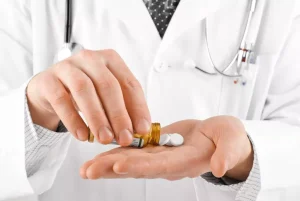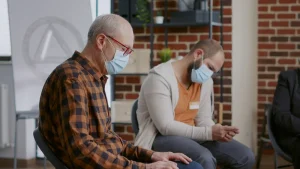
Alcohol-induced anxiety is the uncomfortable feeling that can happen after drinking heavy amounts of alcohol. For those who have an alcohol use disorder, it’s a symptom of alcohol withdrawal syndrome. When you have anxiety and an alcohol use disorder at the same time, you may be able to treat them simultaneously.
Alcohol and anxiety: can booze trigger panic attacks?
The co-occurrence of substance abuse, particularly alcohol abuse, is common among people who have social anxiety disorder. People with this disorder report that alcohol helps lessen their social anxiety, although it often makes it worse. At Talkiatry, our psychiatrists can treat patients with mental health conditions such as anxiety or depression and substance use disorders that occur at the same time.
Why People Use Alcohol for Anxiety
This is especially true when coupled with the physiological symptoms of drinking. Drinking is commonly used to numb anxious thoughts, and yet paradoxically alcohol can cause more panic attacks to occur. If they continue to use alcohol to help them feel more relaxed or at ease, they might eventually feel the need to avoid any social situations where they would be unable to drink. Similarly, people with severe anxiety disorders may be more likely to develop AUD, particularly if they use alcohol as a coping mechanism. A 2018 narrative review suggests that 21.9% to 24.1% of people with an anxiety disorder or mood disorder use alcohol or drugs to relieve their symptoms.
Learn about the conditions we treat
- Instead, so-called third variables are posited to account for their joint presence.
- A person with experience of intrusive thoughts and obsessive-compulsive disorder (OCD), and a leading OCD psychiatrist, explain how to deal with unwanted thoughts.
- This positive feedback loop often is characterized as a feed-forward or mutual-maintenance pattern.
- Administration of these methods for comorbid individuals is complex and may require modification of standard procedures to yield the greatest efficacy.
Benzodiazepines, which are sedative medications, are powerfully effective in rapidly decreasing panic attack symptoms, but they can cause tolerance and dependence if used continuously. Stopping alcohol and panic attacks drinking can also cause you to experience some emotional withdrawal symptoms. You might notice that you feel more anxiety than normal, which can often feel like a panic attack is occurring.

He went on to complete his residency in psychiatry at Harvard South Shore, an affiliate of Harvard Medical School, where he served as Chief Resident and earned his 360° Professionalism award. He then had additional training in Addiction Psychiatry through his fellowship at the University of Texas Southwestern Medical Center. After completing training, Dr. Lin has worked as an Addiction Psychiatrist and Director of Adult Services in the Trauma and Resilience Center (TRC) at the University of Texas Health Science Center at Houston (UTHealth). He specialized in treating patients with a history of depression, anxiety, trauma, and substance use disorders. For most patients, Talkiatry treatment is just as effective as in-person psychiatry (American Psychiatric Association, 2021), and much more convenient.
The third causal explanation for comorbid anxiety and AUDs asserts that anxiety largely is a consequence of heavy, prolonged alcohol consumption. Alcoholism leads to a range of biopsychosocial problems, and anxiety can result from alcohol-related disturbances https://ecosoberhouse.com/ in each of these domains. The course of alcohol dependence is fraught with repeated intermittent episodes of excessive and frequent consumption and withdrawal, which can result in changes in the nervous systems that produce and/or worsen anxiety.
- By clicking “Submit,” you certify that you have provided your legal name and phone number, agree to the terms and conditions and privacy policy, and authorize Addictionresource to contact you.
- In short, for comorbid individuals, the avoidance and escape-oriented coping strategies taught within RPT could perpetuate anxiety problems.
- Ethyl alcohol poisoning generally results from drinking too many alcoholic beverages in a short period of time.
- Given their unpredictable nature, people who suffer with panic disorder find that the anticipation of the next wave of panic is generally worse than the panic itself.
Why Do I Get Super Anxious the Day After Drinking?
It takes your body and liver about eight hours to remove what’s essentially a poison. As this is happening, it can affect your central nervous system and cause you to feel jittery or anxious. Alcohol in the form of ethanol, also called ethyl alcohol, is in alcoholic beverages. It’s also in mouthwash, some cooking extracts, some medicines and certain household products. Ethyl alcohol poisoning generally results from drinking too many alcoholic beverages in a short period of time.
When dealing with health disorders that may be caused or worsened by alcohol use, the first and most essential action to take is reducing or eliminating alcohol intake. For example, research suggests panic disorder typically exhibits a relatively strong association with AUDs, whereas obsessive-compulsive disorder has the weakest relationship with alcohol disorders. Any reminder of the past trauma, including dreams or a random thought, can trigger a panic attack.Learn more about PTSD and alcohol abuse. Post-traumatic stress disorder is an anxiety disorder resulting from past trauma. Alcohol’s effects change your brain chemistry so profoundly that alcohol withdrawal can be a serious medical emergency. When you aren’t drinking, the lack of natural inhibitors can contribute to panic attacks and seizures.

Substance Use
The symptoms of one disorder can make the symptoms another worse; an anxiety disorder may lead to using alcohol or other substances to self-medicate or alleviate anxiety symptoms. Whether or not you drink, your panic attacks need to be addressed separately. Cutting out alcohol will help you cope better, and should reduce the likelihood of experiencing a panic attack, but it won’t stop them altogether. In order to truly take control of your panic attacks, you should make efforts to treat the underlying anxiety that’s causing them in the first place.
- Finally, TCAs may react with alcohol in the brain to cause respiratory depression (Bakker et al. 2002).
- Whether the attack is a result of a substance use disorder or a pre-existing mental health disorder, it is always a legitimate medical condition.
- You may be so afraid of having more panic attacks that you live in a constant state of fear, ruining your quality of life.
- The symptoms of a hangover, such as nausea and vomiting, dizziness, dehydration, and low blood sugar, can make it hard to function.
- According to a 2017 review of 63 studies, reducing alcohol intake led to improvements in both depression and anxiety.
